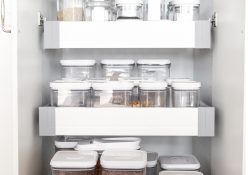Unexpected expenses from home emergencies can cause us loads of stress, so why not make sure you have a plan in place.
The number of South Africans who have an emergency fund is dwindling. According to data from Old Mutual Savings & Investment Monitor, only 30% of those surveyed are setting aside money for life’s unpredictabilities. This is something that needs to change, especially when considering the cost of unexpected home repairs. ‘If you’re a homeowner, you’ll know what it feels like to be faced with large bills for household accidents and the financial stress of not having cash available to pay for the repairs,’ says Sue Torr, managing director at Crue Invest.
And while the expense of maintenance and DIY may appear to be endless, it is, nevertheless, crucial to save for a rainy day. Here are Sue’s tips for creating and contributing to an emergency fund. In this way, you can minimise stress when the unpredictable strikes.
KEEP IT SEPARATE
‘When it comes to setting up a savings account to cover unforeseeable costs relating to home maintenance and repairs, it is advisable to keep these funds earmarked for these purposes,’ says Sue. ‘This is to ensure that your household emergency fund does not serve dual or multiple functions in your portfolio.’ The best way to grow this is to be consistent. ‘Try to contribute to your rainy-day fund on a regular basis, even if it’s a seemingly small amount,’ urges Sue. It all adds up!
KEEP IT ACCESSIBLE
‘While you may have building insurance on your home to protect against events such as a burst geyser, fire or flooding, remember that the claims processing and payment can take time,’ cautions Sue.
‘For this reason, the best place to house your emergency cash is in a vehicle that allows you to have immediate access to your money, earns interest and which you ideally cannot access via your debit card. Sure, fixed deposits and notice accounts can earn you interest but there may delays accessing the money in these accounts and you may be liable for penalties.’ So, what are the most efficient, easy-to-access vehicles for storing your rainy-day fund?
Access Bond Facility: ‘If you have an access bond facility, this is a great place to save your emergency money,’ explains Sue. ‘Although you may not physically earn interest, these additional contributions are saving you interest on your bond and will provide easy access to cash.’
Savings Account: A designated savings account linked to your primary account – but which can’t be accessed using your debit card – is also an excellent place to store your cash,’ says Sue. This means your money is immediately available for large expenses, but not so available that you spend it on something else!
FINDING YOUR FIGURE
How much money should you be setting aside for unforeseeable household costs, though? Well, it all depends on your home. Adrian Goslett, CEO of RE/MAX Southern Africa, advises that homeowners should aim to save at least 1% of the value of the property each year to cover a year’s worth of maintenance. There are other things to keep in mind, too.
‘The optimal amount that should be saved in your home-emergency fund depends on a number of factors,’ says Sue. ‘These include the size and location of your property, the level of insurance that you have in place, your insurance excesses, the number and value of your appliances, the number of geysers, whether or not you have thatched roofing, whether you have a pool, jacuzzi or fish pond and any other factors that may result in higher than normal expenses when it comes to maintenance, DIY and repairs.’
At the end of the day, having a designated household emergency fund in place can be the difference between a hiccup along the road and a complete financial disaster. ‘These savings might not solve the problem entirely, but they can buy you time and options as you consider a way forward.







